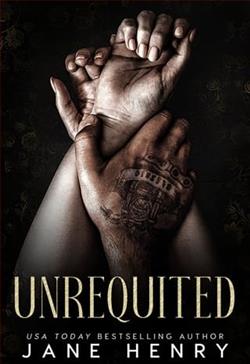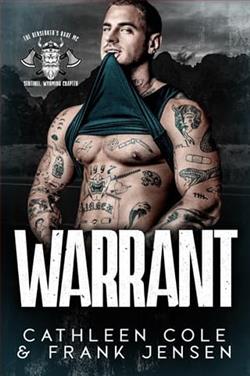Page 99 of Trapper Road
Finally, after several U-turns and a lot of backtracking, I find Josiah’s address. It’s not much to look at, a small house little larger than a single-wide on a square of land surrounded by pine forest.
I park at the street rather than in the driveway, a preference in case I need to escape quickly and don’t want to risk being blocked in. I check my firearm and slide it back into the holster under my arm before shrugging on a jacket. I always feel safer being armed, especially in a situation like this, when I don’t know what I’m getting into. Then I make my way toward the house and ring the doorbell.
The man who answers the door is young, probably in his mid to late twenties, and clean cut with a slender build and an angular face. He keeps the door cracked with most of his body positioned behind it. It’s a familiar stance, one I use often — staying behind the door so you can use your body weight to throw it closed if need be.
His eyes sweep past me, scanning the yard before coming back to land on me. Another familiar habit. He’s as paranoid as I am. I have reason to be. I wonder if Josiah does as well. I keep my senses on high alert just in case.
“Help you?” he asks.
I already have my ID card out and open. He glances at it and instantly grows wary. “Gwen Proctor,” I tell him. “I’m a private investigator. I’d like to talk to you about Juliette Larson.”
As the mention of Juliette’s name his expression shifts, closing down. “Look, I’ve already spoken with the police. I was cleared as a suspect. I have an alibi for the day she went missing, they verified it, and that’s all you need to know. I have nothing more to add.”
He retreats into the house, starting to shut the door.
“I know you had nothing to do with her disappearance,” I tell him. “Her killer confessed this morning.”
He goes still. There’s a wash of emotions across his face that’s hard to follow. “She’s dead?”
I nod.
“You’ve seen the body?” he asks.
“They haven’t located it yet.”
He thinks about this a moment. Then shakes his head. “I wouldn’t bet on her being dead then. Not until they find a body.”
It’s such a strange and cynical thing to say, especially about a young girl. “Why do you say that, Mr. Parker?”
“Josiah,” he corrects.
“Ok, Josiah. You think she’s still alive?”
He shrugs. “Wouldn’t put it past her to pull a stunt like that just for attention. She’s done stuff like that before. She likes to ruin lives.”
I frown. What he’s saying doesn’t square with anything I know about Juliette. “A seventeen-year-old boy is in jail. That’s one hell of a stunt.”
He snorts. “You don’t understand Juliette.”
I’m not quite sure what to make of Josiah yet. Nothing about his behavior has indicated I should trust anything he says. At the same time, Reverend Walker didn’t want me talking to him and I’d like to know why.
“Okay, then,” I tell him. “Enlighten me.”
“Why should I?”
“Because the boy who confessed is named Trevor, and his grandmother has hired me to prove his innocence.”
“Sounds like a tall order when you’ve got a confession.” He crosses his arms, leaning against the doorjamb. “Do you believe he didn’t do it?”
I have no idea what kind of answer he expects from me, or if this is some sort of test, but I tell him the truth. “I believe in keeping an open mind until I have all the evidence.”
He considers me for a long moment. “Fine, I’ll talk to you. But it’s all off the record. I mean it, I don’t want my name brought into this in any way. I’ve had enough of my life destroyed by that girl; I don’t need any more trouble.”
Again I’m struck by the hostility of his feelings toward Juliette, especially after learning that she was murdered. Most people give some sort of deference to the dead, but not Josiah. Of course, he doesn’t necessarily believe that Juliette is dead either. Though I still find it difficult to believe a fifteen year old would fake her own murder, and I haven’t found anything in her life that would make me consider such a possibility.
He points to a pair of chairs in the yard. “You okay sitting outside? No offense, but I don’t like strangers in my house.”
Again I’m struck by the similarities between us and our propensity toward suspicion. I don’t like the idea of being trapped in a stranger’s house, so I say, “That suits just fine.”















